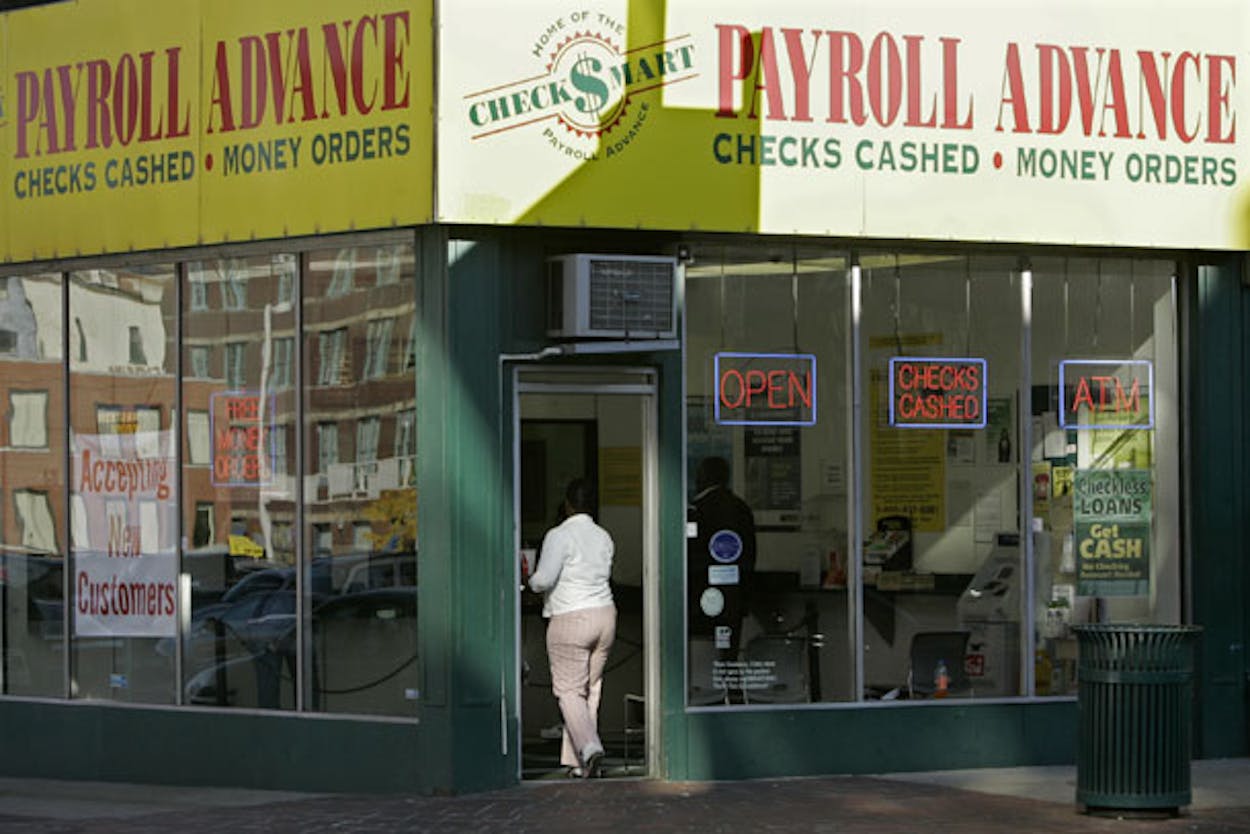There was gavel-banging. There were senators talking over each other. There was, repeatedly, use of a telling phrase: “I’m not trying to get personal.” On Thursday afternoon there was, in other words, a good ol’ fashioned parliamentary fight on the Senate floor.
The fight was nominally over six amendments that Sen. John Carona, a Republican senator from Dallas, intended to include in his bill on payday lending—amendments that were supported by most Democrats. But as tempers flared, it was clear that the fight was also about how much influence the lobbyists have on certain senators, and the power of municipalities to regulate the issue.
The bill, which Carona eventually pulled from the floor, would have placed additional restrictions on the payday lending industry, which provides consumers with short-term, super-high interest loans. To critics, such loans are basically a trap: borrowers who need quick cash may have no other recourse—especially in Texas, a state which has a high rate of “unbanked” people—and find themselves unable to pay back the loan before the interest spirals out of control. As he introduced the bill, SB-1247, Carona sounded optimistic.
“I believe, based on the commitments you all have made, and on the amendments that are being offered, we will have overwhelming support, both Republican and Democrat,” Carona predicted.
But as Senators Royce West and Wendy Davis, Democrats from Dallas and Fort Worth respectively, began to describe the amendments that Carona had committed to adding to the bill, that “overwhelming support” began to look a little underwhelming.
“Let’s talk just raw politics right now,” said West. “The reality is that many of us did not like the bill as it came out of committee, and just like everything else, we worked with this to try and find a balance. And so, I can’t say that I like everything in this bill, but with the amendments, there’s some good things in this bill.” He was, he said, committed to voting for the bill with the amendments.
But Sen. Troy Fraser, a Republican from Horseshoe bay, protested. Carona had, he said, filed the amendments within the previous thirty minutes, and asked that Carona pull the bill down to give the Senators more time to consider it.
“While I’m not accusing you of this personally, I will absolutely state that any efforts to postpone this bill is an effort on the part of the payday lender lobby to kill this bill over the weekend,” Carona responded. He then embarkied on a qualifier-loaded suggestion that Fraser and other Republican senators were changing their votes at the behest of industry lobbyists.
“It amazes me, given the importance of this issue, given your own well understanding of this issue, that you would want to do anything but vote for this bill and pass it as quickly as you could,” Carona said to Fraser. “Because I know you’re here representing your consumers, I know you’re not down here as a shill for the pay-day lenders, and I know you wouldn’t want to do anything that would cripple this legislation over the long weekend.”
Carona, evidently, did not know Fraser as well as he thought. Fraser continued to insist that Carona pull the bill down. Carona continued to refuse.
“I’ll not pull it down,” he said. “I would rather see us vote against—those of you who will wish to do that—the interests of consumers, and have the Republican party be known as the party that is backed and bankrolled by payday lenders, if that’s what you’d like to have.”
At that point Sen. John Whitmire, a Democrat from Houston, stepped into the debate in an apparent attempt to smooth things over.
“I guess I have several questions, but my first would be, what’s the rush?” Whitmire asked Carona.
“Because the interests behind this bill have hired darn near every lobbyist in this town that needed employment. They are behind every corner of this capital,” Carona shot back.
Whitmire, however, didn’t seem to be convinced: “Earlier, even 48 hours ago, everybody was gearing up to kill your bill, and now it’s a pretty good bill. In fact, we’re being told, you either take this or you’re gonna get something worse. Why don’t we all just decide to look at it closer and don’t listen to outside influences. Wouldn’t that be a novel idea?”
Then Whitmire added that he would vote against the bill, because he felt it would limit local freedom. Though the payday lending industry is already regulated by municipal codes in several Texas cities, including Dallas, Austin, and San Antonio, Whitmire’s hometown, Houston, is not one of them. Carona’s bill, as written, would trump those municipal codes and put in place a statewide system of regulations, preventing officials in Houston, or any other city, from making their own decisions about payday lending. By this time, Whitmire was shouting at Carona across the Senate chamber.
That announcement led to several tense minutes of Whitmire and Carona arguing over each other while Kevin Eltife, a Republican from Tyler who was standing in for Lieutenant Governor David Dewhurst, repeatedly rapped the gavel. Eventually, Carona acquiesced, but unhappily.
“I’ll tell you this,” he said. “Today, there are 28 members who have pledged to vote for this bill. We’re gonna come back on Monday, and let me tell you, we’re gonna be hard-pressed to get 21. In which case the legislation dies. In which case, only one industry wins… the winner will be the payday industry.”
Carona ended with a promise, or if you prefer, a threat: “I’m gonna [pull it]. But I’ve got 28 names today, and when we get down to some number below 21, which I hope we won’t, then we’re gonna talk very publicly about what changed the minds of those people who were once at 28 and are now somewhere else.”
Minutes later, Carona vanished from the Senate chamber, leaving his desk and chair vacant, and did not return.
- More About:
- Politics & Policy
- John Carona






